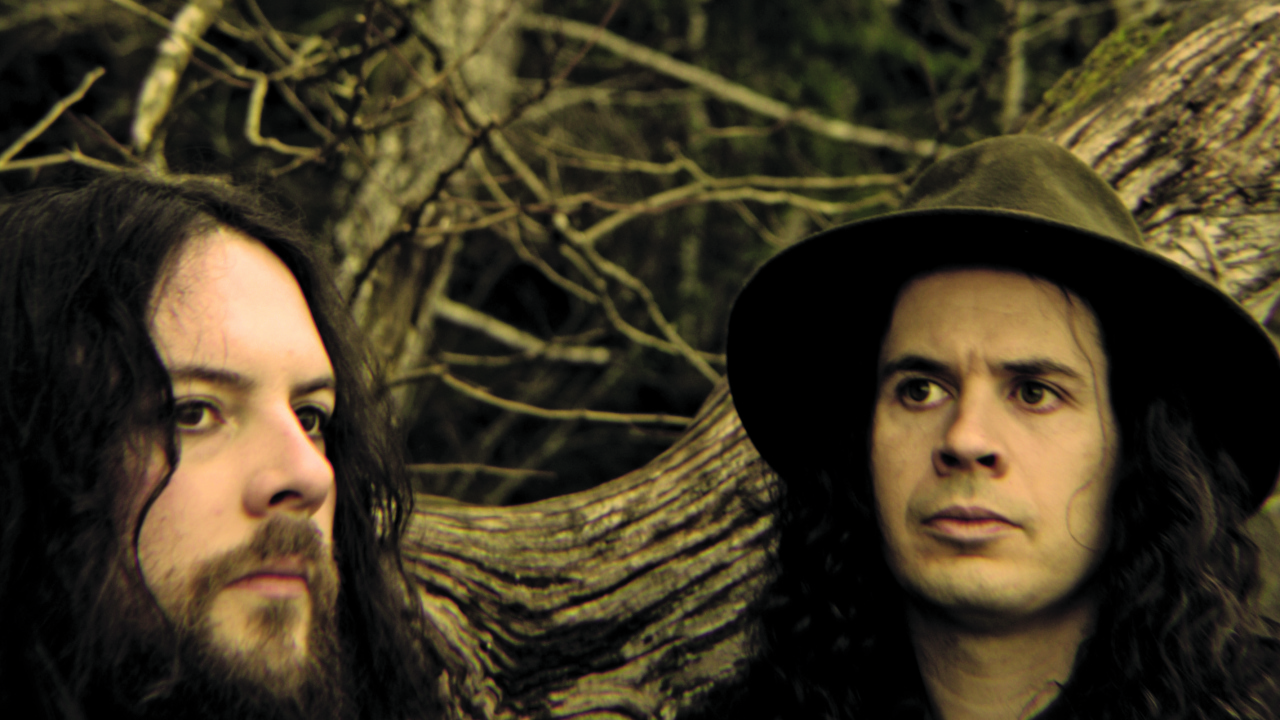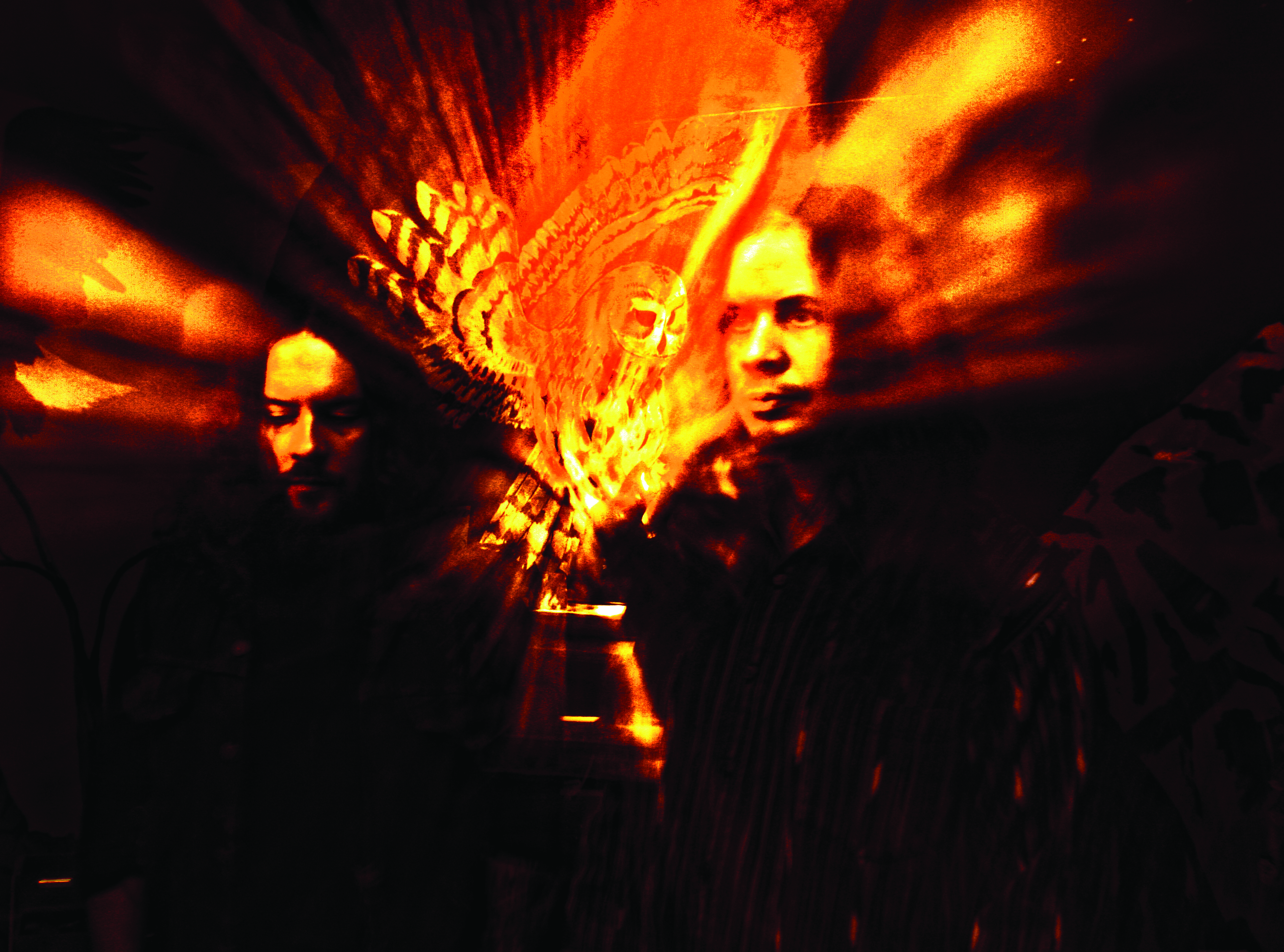Leading The Pack
Wolves In The Throne Room have gone so far down a different route from their usual heavy sounds on album number five that they even considered changing their name for the record...

Formed in 2003 in Olympia, Washington by brothers Aaron and Nathan Weaver, Wolves In The Throne Room have proved to be one of the most original black metal bands of the last decade, in part due to their scant regard for the genre’s traditional mores. Although inspired by the Scandinavian black metal scene of the early 90s, theirs is an altogether more surreal soundscape in which prog and psychedelia poke their prongs into the fray.
It was while recording the album that they hit upon an idea that eventually resulted in the creation of their latest effort, Celestite, an album that breaks almost completely with everything they’ve done so far. Instrumental and almost entirely electronic, it’s a bold and brave move, even for a band as fearless as this.
“We hatched the idea when we were recording Celestial Lineage,” confirms Aaron. “We always have the same notion when we’re mixing a record and we’re balancing the guitars and drums. At certain points you’ll mute the guitars and drums on the console and be left with just the atmospheric stuff, the synthesizers and maybe the more tripped-out psychedelic guitar sounds, and all of us in the studio are like, ‘Man, that sounds awesome! That should be the record!’ Those sound elements have always been there – we’ve just brought them to the forefront.
“The second part of the idea was really wanting to push ourselves to do something new, because we got to the point where writing our epic 20-minute metal tracks was on the verge of becoming formulaic in that we had it down to a science and felt we really needed to do something different to shake up our writing process.”
The result is an immense, immersive ocean of sound, which, although almost unremittingly bleak, is not devoid of delicacy. It sees Aaron, who played drums previously, and Nathan, who handled vocals and guitar, both working on synthesizers and guitars.
“It’s a sub-root chakra vibration!” laughs Aaron. “We did a sort of Brian Eno approach in terms of using the entire studio as an instrument, running the sounds through the console and all the effects processors a couple of times until they were warped beyond recognition. That was our starting point and we built a whole other record on top of that, an entire city of the burnt‑out remnants of what had been there before.”
What long-term fans will make of Celestite remains to be seen (in fact, we shouldn’t discount the band attracting a new audience), but Aaron is adamant that however experimental in nature, this album is pure Wolves In The Throne Room, through and through.
Sign up below to get the latest from Prog, plus exclusive special offers, direct to your inbox!
“It definitely exists in the same universe,” he states. “The way we conceive the music is very spatial, architectural almost, so to us, Celestial Lineage is a place that we went to, experienced and brought the music back. So Celestite, because we conceived it as a companion record, it takes place in the same universe. The same themes, characters and images appear, but in an altered form.”
Fenriz, drummer with Norwegian black metal legends Darkthrone, released a pair of cosmically inclined dark electronic albums back in the 90s under the banner Neptune Towers. There was never any question of these appearing as Darkthrone releases and Aaron confirms that the name issue did come under discussion.
“Nathan and I have always had a tacit agreement that if we wanted to do something different, it would be under a different name,” he explains, “and of course this came up with Celestite. We thought about it, but this record really fits into the Wolves In The Throne Room progression – energetically, thematically, in terms of the concept and sound… it just fits. In future we’ll re-incorporate guitars and drums. This is just a detour or an intermission. But you will not see Wolves do a techno record, I can assure you!”

In its own way, Celestite is certainly every bit as challenging and forbidding as the band’s other work, but to better understand the energetic and thematic connections Aaron refers to, it might be useful to ask: what’s in a name?
“The name Wolves In The Throne Room sums up the basic concept of what the band has always been about,” says Aaron, “which is connecting with wildness, with feral-ness, of living beyond the boundaries of civilisation. Our music is trying to connect with energy that is beyond our comprehension and control. Once the wolf gets inside the throne room, everything changes. It’s an event horizon. Once you touch that wildness for the first time, if you’re living your life with your dead-end job and your TV, one encounter with that wildness, it’s a game changer. A lot of things have changed over the years, but the name still feels really relevant.”
One look at the band’s publicity photos shows them very much at home in the wild as they stalk around forests and abandoned buildings, often at night. All very black metal in aesthetic terms, but given their periodic ambivalence about the label and lack of adherence to its rulebook, is the term still relevant?
“It was definitely our choice to take on that mantle,” says Aaron, “to work within the confines of black metal. There’s a very specific sonic palette that characterises black metal and we absolutely adopted those things, whether it’s blasting, trance-inducing drums or tremolo guitar or the specific type of vocals, or an overall raw aesthetic. It’s the kind of thing we’ve always danced around because something about black metal obviously called to us and is very meaningful. There are also things in it that aren’t meaningful to us and so we’ve kind of found our own way over the years.”
Perhaps the best summation of what Wolves In The Throne Room stand for is an atavistic rejection of slick and superficial modernity, of the trinkets and toys and time-wasting distractions that separate us from our true selves. When the American Dream becomes a nightmare, it’s time to wake up. Through the evocative atmospheres of their music and the cathartic energy of their fire-lit stage shows, the band channel their cynicism on the great disconnects of the digital age into a harsh, harrowing and yet ultimately redemptive experience.
“We definitely have the intention to bring an energy of transformation to our live performances,” Aaron agrees, “as much for ourselves as for an audience, but we don’t have a specific agenda. Whether they experience catharsis or whether they experience terror or ecstasy… people have all those kinds of experiences. And we definitely have a prejudice towards the analogue in life, whether it’s the equipment we use or the way we go about things. We’re just not young enough to have bought in to the whole digitisation of one’s entire life. It’s just not something that works for me.
“I just don’t know what to make of this new world we live in,” he concludes. “I’m ready to check out.”
Celestite is out now on Artemisia Records. See www.wittr.com for info.
KEYS TO THE THRONE ROOM
Aaron Weaver reveals all about the Wolves sound.
The Weaver brothers have an analogue synth fetish. Over the years they’ve assembled an impressive arsenal of vintage kit, a sizeable portion of which has been deployed on Celestite, including a Korg Polysix (as used by luminaries such as Keith Emerson and Jean Michel Jarre), Korg Mono/Poly (sister synth to the Polysix), Roland Jupiter-6 (Vangelis, King Crimson), Roland JX‑10 (Pink Floyd, Tangerine Dream), Roland Juno-106 (something of a unique overlap between the analogue and digital worlds), Korg MS-20 (recently revived by Korg in kit form), Jomox AiRBase 99 (a little-known but classic 80s drum machine), and a Serge Modular System (as used on the first Greenpeace anti-whaling expedition to simulate whale sounds).
“Everything on the album is our gear with the exception of the Serge modular system,” explains Aaron. “I have a small modular system of my own, but the Serge is better. It just has a certain sound to it that’s so magical. My life now is shuffling synthesizers around and I just spent this morning moving synths from my house to Nathan’s because I’ve run out of room. Our old practice space when I was at high school had, like, a Roland Jupiter-8, Jupiter-6, a Minimoog and all this stuff and it was just like junk, garage sale stuff. It’s a different deal now!
“The whole sound of Wolves In The Throne room is this rich, earthy, warm sound that you can’t get with digital. The irony of course is that we put all these crusty old synths into a digital recording system and then onto CD and then it flies around the internet. But we’re pretty picky that our source material comes from the old stuff. What is it about it that’s important to us? It’s about decay. Some of these synths are like 40 years old and they’re falling apart, and there’s something about that sense of decay that feels really relevant to our music.” GM
